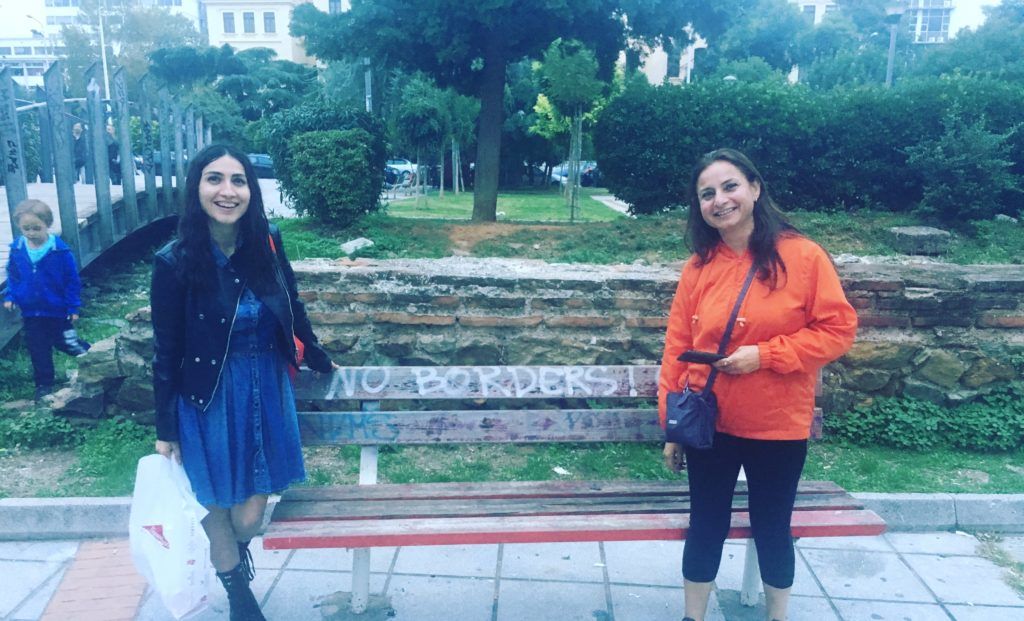European Cooperation (EC) Day: dialogue with youth
Borders. What lies behind this word? Our perception may be very different from one to another, depending on where we come from. On one hand, there are people living in border areas. These lines, which separate two countries administratively, are also a link, a window to the other, an opportunity to meet. Often linked to great history, these borders play a major role in the identity of people. Countries bordering the EU (Russia, Belarus, Ukraine, Moldova, Tunisia, Lebanon, etc.) share many aspects with their neighbouring member states. Many positive initiatives are supported by the European Commission under ENI CBC for maintaining ties and cooperation across borders of the EU.
On the other hand, external borders are sometimes associated by EU citizens with walls and barriers. This is certainly a hot topic nowadays, often tackled by the media in a dramatic way. Without denying a certain reality, how can we try to give citizens, especially when they are far away, another perception of the EU’s external borders? How can we show another side of the reality, where men and women come together and pool their efforts to achieve common goals and build a common future?
Young people – a priority target group
At the beginning of 2017, Federica Mogherini, High Representative and Vice-President of the European Commission, underlined that young people are “a breath of fresh air” and “are looking for ways to get involved”. They want “to do something good with their life and for the community” and “to be the drivers for change”.
Far away from Brussels and western Europe, people working in the field of cooperation across EU’s borders are promoting tolerance, acceptance of differences, supporting projects that bring people from various horizons together. The actions supported there give hope and new perspectives which is exactly what the young generation needs today to believe in the European project.
So we wondered. How can we engage our younger generations, here in Brussels, and raise their interest in the topic? How can we propose to them to get to know this cooperation across borders and provide an alternative narrative to the one based on fears given by the mass media over the past years? Not an easy question but we decided to try, our objective being to match young people from Brussels with ENI CBC actors.
TESIM in partnership with IHECS and BOZAR
For this match, TESIM looked for partners that could help in avoiding traditional communication flows and address the younger generation in Brussels….young students that could be open to this topic, willing to think and prepare to engage in their own communication activities in order to spread another type of word. And we found two partners.
Together with IHECS, a Brussels-based university specialised in communication, and BOZAR, the museum of fine arts in Brussels, TESIM will follow in 2017/2018 a project in the framework of « Next Generation, Please ! ». This project aims to encourage young Belgian citizens to become aware and creative citizens able to express themselves in a Europe that is ready to listen to their opinions and ideas. To this end, “Next Generation, Please!” brings together artists, intellectuals/experts and young people around a common artistic project. Through a creative process resulting in concrete products such as a film and audio-visual tools, the multiple interactions between these young people and their mentors serve to structure their critical thinking and stimulate their powers of expression.
EC Day – kick off on 26 September
The “kick off” of this entire initiative is the EC Day event which will take place at the IHECS school in Brussels on 26 September. Here, a group of Masters students will have the opportunity to meet ENI CBC programme representatives from both Member States and neighbouring countries of the EU. For the first time, the students will find out more about what these programmes achieve at the borders of the EU using interactive methods including storytelling, a world cafe set-up and speed dating. Short film clips will be gathered during the event of students’ first impressions of the programmes and the topic of CBC. 12 students will then visit programme areas in November 2017 to gain a first hand insight into the added value of these stories of partnership across borders. They will meet those individuals on the ground that bring cooperation to life. These visits will form the basis of an audio-visual tool to be produced and further promoted in 2018 to a wider audience during the exhibition for “Next Generation, Please!” at BOZAR in May 2018.
Follow the process
In Autumn 2017 and in 2018, TESIM and certain ENI CBC programmes will be fully engaged in this dialogue with youth, starting with EC Day and continuing with the travels of Brussels’ students to border areas until the production of the audio-visual product and the exhibition at BOZAR in 2018. We will be happy to follow these young students together with their teachers and an artist: report on their questions, their thoughts, their opinions about the topic and the creative process they will adopt. Follow this story in the ENI CBC bulletin and on our social media.
